Tel Aviv University hosts three international delegations
On July 25, a remarkable convergence of events took place at Tel Aviv University, showcasing the spirit of innovation, solidarity, and learning. The Lowy International School hosted visits from Columbia University faculty, leadership of several Indian universities, and a large group of American undergraduate students.
Columbia University Solidarity Delegation
As part of the ongoing series of solidarity visits from elite universities and TAU partners, Columbia University faculty came to Tel Aviv to talk about antisemitism, BDS in the context of international collaborations, freedom of speech, and the state of TAU post-October 7th.

TAU President Prof Ariel Porat talking about Tel Aviv University initiatives post-October 7
The discussions were led by Prof. Ariel Porat, TAU President, who described all the challenges TAU has been facing since October 7, including assisting student reservists return to their studies, joining the country-wide volunteer efforts, and protecting academic freedoms.
Despite the challenges, Israeli academia, particularly at Tel Aviv University, has seen significant international support from colleagues and institutions abroad. “At the same time, we’re at a point in which we are seriously concerned about the state of international collaborations in Israel and at Tel Aviv University,” noted Prof. Milette Shamir, VP for International, highlighting increasing institutional boycotts from European universities and silent disengagements by individual faculty, which could severely impact young researchers first and foremost.
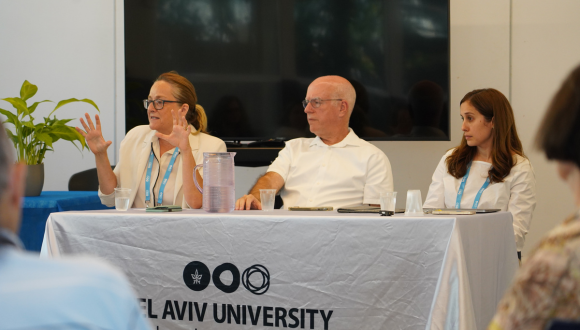
Prof. Milette Shamir, Prof. Ariel Porat, Ms Camellia Darawscha at the meeting with Columbia University faculty
Prof. Shamir described some of TAU’s new initiatives to support internationalization:
“We give support to faculty to prepare them as they go abroad now for how to conduct themselves and how to cultivate ties despite the situation.”
The university has also joined a task force formed by the VERA committee of university presidents to counter the boycotts: “They’re collecting the data, but they’re also leading, for example, the efforts to have a legal stance at the European Commission,” explained Shamir.
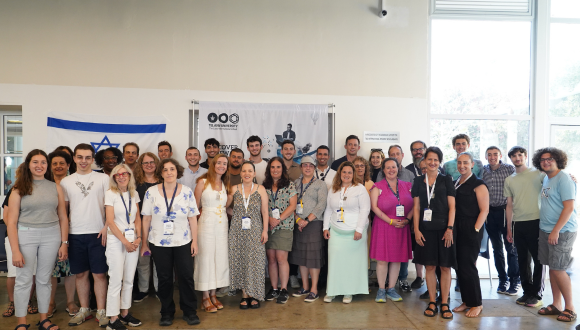
Columbia University delegation and students of the Dual Degree TAU–Columbia BA Program in Liberal Arts
In addition, the Lowy International School is actively promoting study abroad programs for international students and exchange programs for TAU’s Israeli students. This fall, over 200 undergraduate and graduate students will spend a semester abroad.
“It’s very important for Israelis now to be present on campuses around the world,” – commented one of the delegation participants.
Ms Camellia Darawscha, Diversity Officer at the TAU Equity, Diversity, and Community Office Commission, spoke about the measures the university undertakes to ensure a safe campus environment for all students, including staff training sessions and personal consultations on dealing with diverse classes, monitoring and regulating incidents of microagression and harassment, and regulating hate speech.

Columbia University faculty
“Despite the complications, inspiring things are still happening. One example is a project named The Artist’s Lake. It’s a community theater of Arab and Jewish students who have never studied acting, and they act together on stage. Another example is Force and Dialogue through Palestinian artists.”—Camellia Darawscha
The visit also featured a discussion about antisemitism, its current meaning, origins, and implications with Prof Dina Porat, Emeritus in the Department of Jewish History and the Chief Historian of Yad Vashem.

As part of the visit, the delegation met with students and alumni of the Joint Dual Degree Liberal Arts BA program between Columbia and TAU. Lisa Rosen-Metsch, the Dean of the Columbia School for General Studies, while not present at the meeting, sent her message:
“While these past months since October 7th have been extremely difficult, I have no doubt that our dual degree students will pull through, and the intellectual, social, and emotional education that they are receiving will yield the outcome of our students becoming future leaders in the world who has never needed them more.”
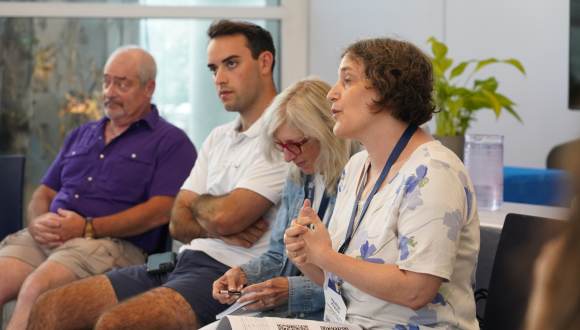
Prof Krasna (right), Associate Dean of Columbia Mailman School of Public Health reading the address from Prof. Rosen-Metsch, the Dean of the Columbia School for General Studies
Rosen-Metsch added in her letter: “I and my colleagues at Columbia, as demonstrated by their presence today, are doing everything possible to make sure we remain the destination Ivy League school for every student from Israel, and that our students are welcomed, supported, and receive the best intellectual experience at Columbia.”
“I’m very grateful to our colleagues at Tel Aviv University for being such outstanding academic partners.”—Prof. Rosen-Metsch
Elisha Baker, Columbia junior, described the initiatives of the Jewish community on campus and answered questions from students who will be starting their classes at Columbia this fall.
“I will double down on needing more Jewish students to apply to Columbia so that we can build a stronger community. We already have a very strong one, but build it even stronger, raise our voices even more.”—Elisha Baker, Columbia student

Columbia University delegation and students of the Dual Degree TAU–Columbia BA Program in Liberal Arts
Expanding Collaborations with India
Another solidarity visit was organized by the Israeli Embassy in Delhi and the Foreign Ministry. The delegation comprising university vice-chancellors and leaders, representing the Thapar Institute of Engineering & Technology, Karunya Institute of Technology and Sciences, University of Mumbai, and 12 other institutions from across India met with Prof. Milette Shamir and Prof. Colin Price who gave a talk on sustainability and climate crisis.
“We come to Israel to show solidarity.”— Prof E J James, Karunya University
Since 2016, Thapar Institute of Engineering & Technology and Tel Aviv University have collaborated on food security and advanced manufacturing research. Professor Yossi Shacham from Tel Aviv University initially led the Center for Excellence in Food Security, succeeded by Professor Nir Ohad.
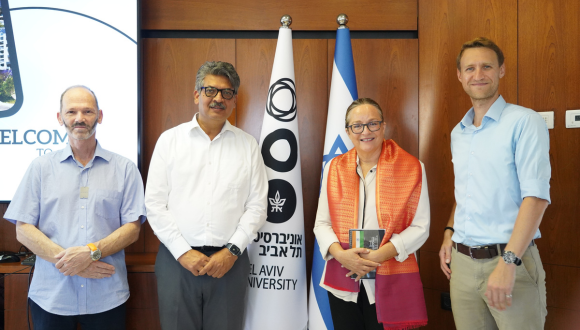
Prof Ohad, head of the Food Security Center; Prof Batish, Thapar Institute of Engineering and Technology; Prof Shamir, VP for International at TAU; and Konstantin Platonov, TAU Asia Engagement Director (from left to right)
Professor Noam Eliaz is the inaugural Chair Center of Excellence in Advanced Manufacturing. There are also joint projects with Prof Ram Fishman and Prof Hadas Mamane, including Digital Villages, water treatment and irrigation models, and perishable fruit sensor technologies.
“The water treatment model has been adopted by the government of Panjab and is implemented in 13000 villages.”—Prof Ajay Batish, Thapar Institute of Engineering and Technology.
The partnership also includes student exchange, with Thapar University sending top students to Tel Aviv University for life sciences and engineering programs and hosting Israeli MSc students who work in the farms with Indian farmers and experimenting with various aspects of the Digital Villages project.
“I’m very proud of them because these boys, despite not knowing the local language and handicapped with not knowing the way to that place and also needing support to get there, they’ve done extremely well. They’re like mini celebrities in those farms and villages because people love them there. So I think that way it has been a big success from both sides,” comments Batish.
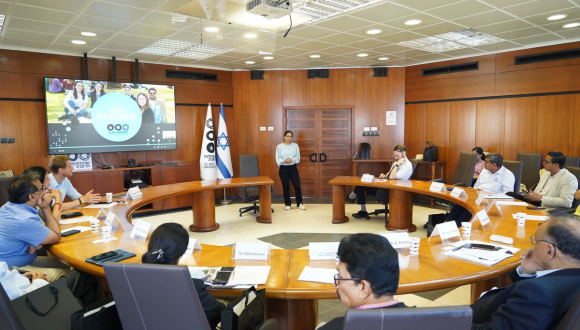
The leader of the Indian student community at TAU meeting with the delegation
Members of the delegation expressed a lot of interest in building connections with TAU, particularly in the fields of agriculture, climate, cyber security, and also fine arts. As Prof Avkash Yadav from the University of Mumbai said, “Our relations with Israel have a lot of potential.”
“We can collaborate in the space of climate change and thunder-lightning.”—Bal Raj Singh, Vice Chancelllor of Sri Karan Narendra Agriculture University.
As part of their visit, guests from India went to other Israeli universities, toured Jerusalem, kibbutzim in the south, towns in the north, and met with families of hostages.
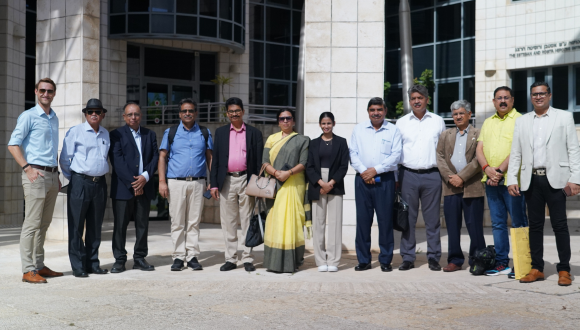
The Indian delegation to Tel Aviv University
They also went to the Israeli Chamber of Commerce and met with some young innovators who are in the process of setting up their own companies or startups.
“They have really brilliant ideas. One of them has already reached out to me on LinkedIn because his product looks very exciting to me. So, I am going to try and work with him and see what we can do together.”—Prof. Batish
Largest Student Visit to TAU Led by Jewish Learning Initiative on Campus
For the second consecutive year, The Lowy International School hosted 250 JLIC summer students to learn about Tel Aviv University and its multi-disciplinary academic offerings. American undergraduates came to Israel to learn Torah and intern in Jerusalem or Tel Aviv.
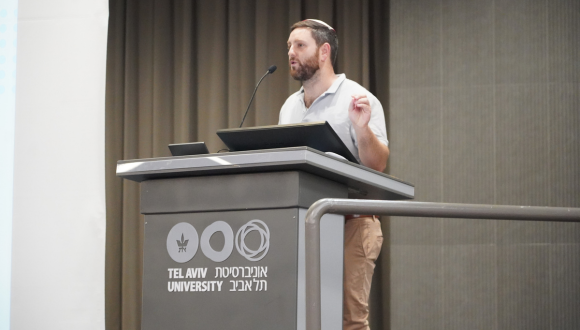
Rabbi Eitan Philips, head of JLIC at Tel Aviv University
Rabbi Eitan Philips, who is leading the JLIC at Tel Aviv University, shared his journey with students, emphasizing the significance of their choice to come to Israel and Tel Aviv University despite the challenges:
“Think about what Tel Aviv means to you, think about what this university can offer you, and think about how your Judaism, which you’ve spent a whole summer now involved in, what it has to say to the whole world.”—Rabbi Eitan Philips
Reflecting on the turmoil before October 7th and his own experiences in Gaza, he highlighted Tel Aviv’s role as Israel’s face to the west: “Tel Aviv represents what we have to give to the world, what we have to give to humanity, our particularism and our universalism.”
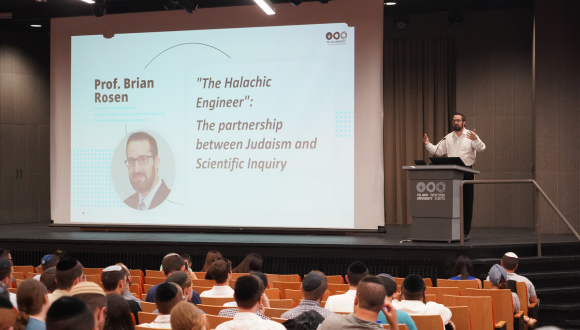
Prof Rosen, TAU Faculty of Engineering
Professor Brian Rosen, from the Faculty of Engineering, discussed the intersection of his scientific and religious life, emphasizing that both realms seek different aspects of truth.
In his talk entitled ‘The Halachic Engineer’ he shared a story from the 1960s about the discovery of the Big Bang Theory, illustrating how scientific advancements can complement rather than contradict religious beliefs.
“The advancement in one field does not need to come at the expense or the dignity of another.”—Prof. Rosen

JLIC students at Tel Aviv University
He encouraged students to see their academic pursuits and Torah study as integrated rather than conflicting: “To study science and engineering and any other discipline here can be done in parallel to Torah study because you’re looking for a single answer.”
Quoting Rabbi Jonathan Sacks, he concluded, “Science takes things apart to see how they work, Judaism puts things together to see what they mean, and we need them both,” stressing the importance of a harmonious balance between scientific inquiry and spiritual meaning.
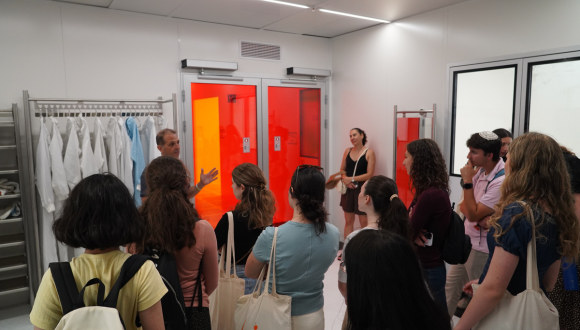
JLIC students visiting the new Nanotechnology building
As part of their visit, students met with representatives from TAU faculties: Nanotechnology, Business, Neuroscience, Engineering, Social Sciences, Environmental Studies, as well as the Moshe Dayan Center. Each faculty introduced a topic within their field of study allowing students to experience the breadth of learning and innovation that takes place at TAU.

An olah hadasha and TAU Sofaer MBA graduate Rachel Thau talking to JLIC students about her startup that verifies the validity of news statements online
They also got to see the lab and learning facilities of Tel Aviv University, including a neuroscience lab that uses EEG equipment and an industry-grade clean room at the recently inaugurated Roman Abramovich Building for Nano and Quantum Science & Technology.
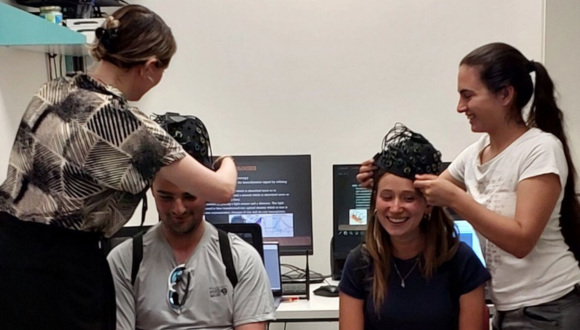
JLIC students on their visit to the Sagol School of Neuroscience
The day events of the day exemplify the spirit of collaboration, resilience, and academic excellence of Tel Aviv University. From hosting international delegations and holding meaningful discussions to showcasing cutting-edge research and innovation, TAU continues to strengthen its global ties and inspire future leaders.
